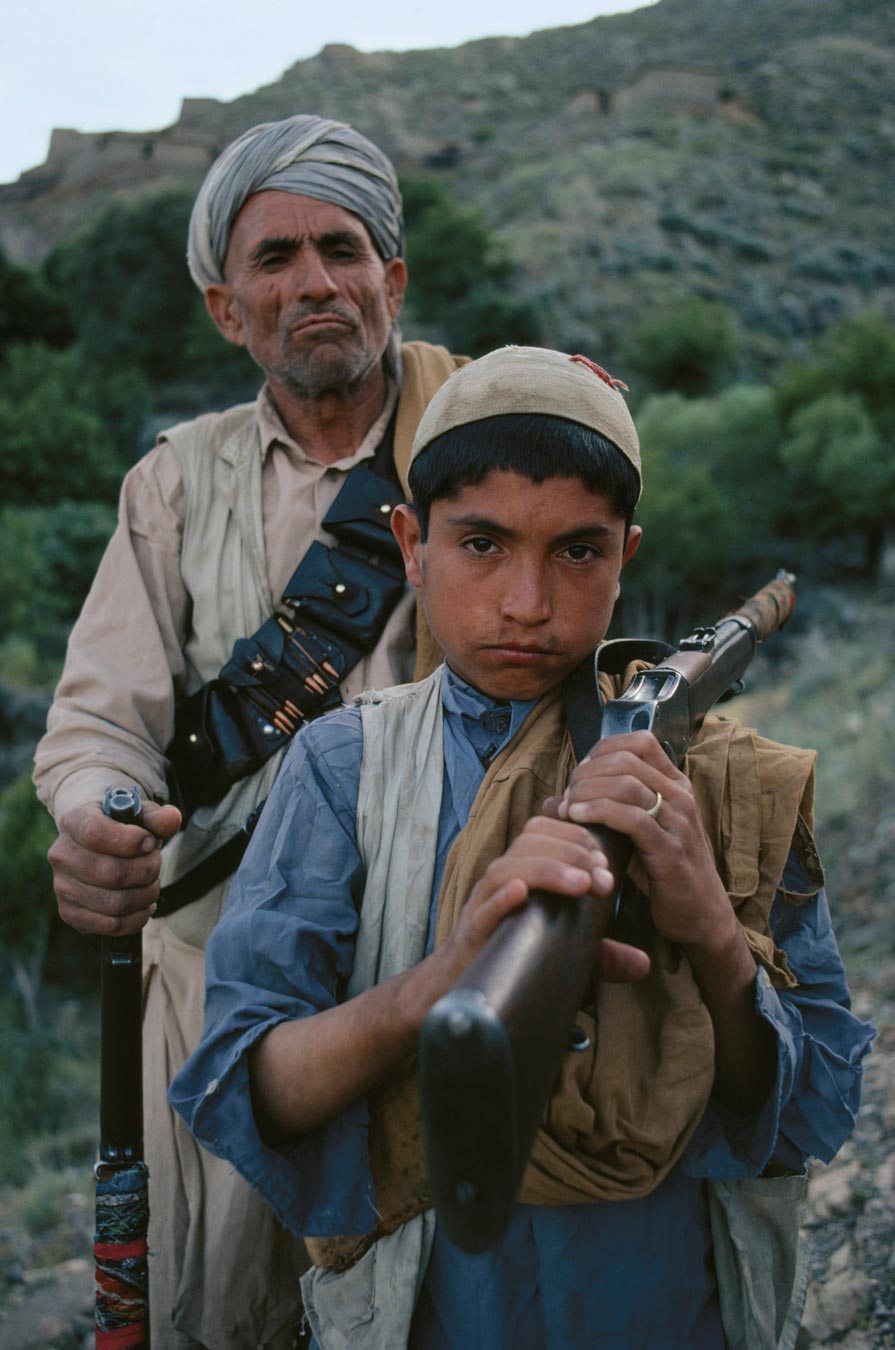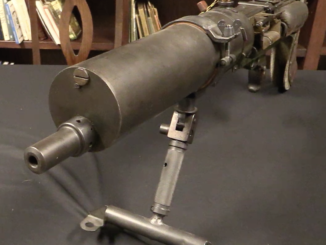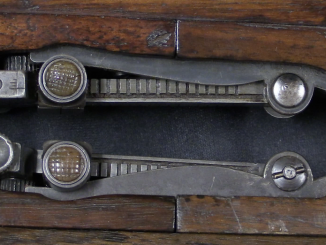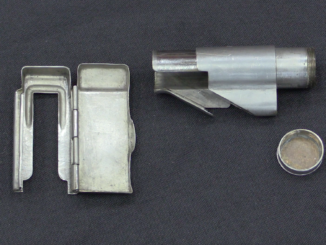
One day the boy will inherit the SMLE, and probably go on fighting whichever country has decided to occupy Afghanistan by that time. Maybe it will be China? They haven’t taken a turn yet. Having the will and strength to fight invaders is a good thing; having to actually do it for a hundred years straight is not conducive to a healthy and prosperous society.
That said, I wouldn’t mind having one of those bandoliers myself. And who knows if the Martini is British or locally made.




What did you expect? Everyone wants to take over Afghanistan in order to secure territory and bragging rights (well, most Americans want to get out of Afghanistan because it’s a pain in the rear end to get rid of extremists). For locals to band together and use mostly outdated stuff to harass invaders who can’t get over the conspicuously placed rocks in the road seems somewhat funny.
Notice that Басмаче (Basmachi, Muslim rebels fighting with Red forces during Russian Civil War Era) are sometimes considered last White Russian of Russian Civil War as because the last fight with them was in 1942. However the Basmachi belonging to White Forces is arguable, they fight against Red but not all forces enemy to Red was allied with White (see Makhno Black Army or so-called Green Army which fought in Tambov Rebellion)
“And who knows if the Martini is British or locally made.”
Well, after handling several of the latter variation, I’d say – if it works, it’s British. May be India-made, but under the British Raj. Those made locally are at best the tourist-souvenir quality, and I’d never care to load them, let alone pulling trigger.
Love the bandolier too.
Funny— the guns readily available in the states but
can’t find that Omar Sharif bandoleer?
Why won’t some make or import them?
Someone – an old sergeant would be my guess – probably is on a small but lucrative scale. We did some pre-patrol refits out of Rota in the late 70s and our chief torpedoman (who had grown up speaking Pennsylvania Italian and got by quite well in Spanish) had discovered that in pre-democracy (Franco was dead but the constitutional monarchy was still a few years off) Spain handcrafted leather goods and hand-carved wooden kitchen utensils were very, very cheap from local artisans. He would rent cargo ship space (this was before containers) and ship the stuff to New Jersey by the cubic yard for his wife to drive down from Connecticut to pick up and sell at craft fairs. A very lucrative “rice bowl.”
Some places in the world are just fated by geography and human nature to have foreign armies going into them. More to be able to get somewhere else than a desire to live there. The northern European plain is another example.
It certainly greatly influences the local culture and the thinking of the people.
Weren’t the Chinese in Afghanistan back around 1300? Back when they invaded, conquered and ruled Persia(Iran). Maybe this would be consider invaded by Mongols and ruled by Chinese.
The Tang Dynasty briefly occupied parts of modern day Afghanistan in the mid-7th century, which to my knowledge is the only Chinese occupation of Afghanistan by actual ethnic Han Chinese rulers. Furthermore, the rule of the Mongol-founded Yuan dynasty over Afghanistan in the 14th century was purely ceremonial.
Rather than occupying them, they will buy them. Afghani president was seen in Ufa on last BRICS potluck.
T’was said of Israel, like Poland (God’s playground)and Afghanistan (cockpit of Asia),they decided to make their country in the middle of a Freeway.
A society armed and willing to fight for its freedom is certainly healthy and ,equally certainly ,not prosperous .
Or maybe prosperity is not measured in monetary terms only .
A country that is liberal (in the classical sense) has people who can afford or make the best weapons to defend their wealth with.
Unfortunately, it eventually develops sufficient parasites for the parasites to indulge in imperialism and destroy the society.
Examples: China, Portugal, Spain, Netherlands, France, Sweden, England…. And now America.
Odly enough, playing with Afghanistan is a fairly good indicator that the parasites have reached peak hubris, and its downhill from there on. Like monkeys with their hand in a jar, they could let go anytime, but they never seem to, so downwards they go.
The length of time that China stagnated, and Spain and Portugal have continued to stagnate, gives an indication of how persistent the parasitic sense of entitlement that imperialism engenders, can be in a society.
It’s interesting to note that Alexander the Great did his best to go around what is now Afghanistan, rather than through it;
http://2.bp.blogspot.com/-b9WMIQwEuyo/TWcIk6w0FII/AAAAAAAAADk/mJlrAOeL9CM/s1600/Alexander+the+Great%2527s+Journey.png
Apparently the Pathans were known to be Bad News even back then.
cheers
eon
One of his castles still stands in Qalat City (Zabul Province) Afghanistan.
https://www.youtube.com/watch?v=ZR5OPrqMu_s
https://www.google.com/search?q=alexander+the+great+castle+in+afghanistan&rlz=1C1RNLE_enUS531US532&espv=2&biw=1680&bih=925&source=lnms&tbm=isch&sa=X&ved=0CAYQ_AUoAWoVChMIutbT_rPlxgIVBzWICh24KQOs#imgrc=xhPt1wlIAh8hkM%3A
When attempting to enter ANY Arabic territory, never forget the First Dictum of their society, “Me and my Brother against our cousin; We and our Cousin against the World!” This gleaned from living among them for five of my seven years in college. This has not changed in 3,000 years, or so it is claimed.
Pashtun, not Arab, Mr. Bill.
Yer not gonna find many Arabs in Afghanistan. They’re gonna be Hazaris, Pashtuns, Uzbeks, Tajiks, Nuristanis, and a couple of others. However, the maxim holds true to any tribal peoples. Of course, tribal culture can be used to adequately sum up 99% of humanity.
Back in the Eighties there were some, indeed, helping the mujahideen fighting the Soviets.
You are right Steve: “tribal culture”; this is where we are from.
Denny:
You are correct in your classification: The Pashtuni Culture predates that of Islam by several centuries but they have been intertwined since the time of Mohamed and are in many ways no longer distinguishable. They also are markedly adverse in may ways. This is shown by the following which is a short listing of the tenants of Pashtunwali. I was referring to all Islamic and related variations, better understood by the general public as “Arabs” in most cases. This dictum is prevalent in most of these cultures and nationalities that I have encountered thusfar. However, the variations are remarkable as is shown by the shortened listing of beliefs of the Pashtun. One glairing divergence is Dictum #9 (Naamus regarding the protection of all women) compared to the practices of the more strident followers of Islam. The basic nature of their culture was revealed early on by none other than Winston Churchill in the following quote:
“The Pathan tribes are always engaged in private or public war. Every man is a warrior, a politician and a theologian. Every large house is a real feudal fortress….Every family cultivates its vendetta; every clan, its feud…. Nothing is ever forgotten and very few debts are left unpaid.” By: Winston Churchill:: This is the basis of the cultural beliefs I quoted above and it is believed to have been adopted by the followers of Islam from the Pasthun people. I would point out that these beliefs were not specific to the Pashtun; the followers of the Japanese Code of Bushido (“The way of the Warrior”), the culture led by Shaka kaSenzangakhona (better known as “Shaka Zulu” by Europeans) and others throughout history. The guiding tenants of the Pathan are:
The Eleven Pillars of the so-called “way of the Pashtuns” or “Pashtunwali Code:”
1. Melmastia (hospitality) – Showing hospitality and profound respect to all visitors, regardless of race, religion, national affiliation or economic status and doing so without any hope of remuneration or favour.
2. Nanawatai (asylum) – Derived from the verb meaning to go in, this refers to the protection given to a person against his enemies.
3. Nyaw aw Badal (justice and revenge) – To seek justice or take revenge against the wrongdoer. No time limit restricts the period in which revenge can be taken.
4. Turah (bravery) – A Pashtun must defend his land, property, and family from incursions.
5. Sabat (loyalty) – Pashtuns owe loyalty to their family, friends and tribe members. Pashtuns can never become disloyal as this would be a matter of shame for their families and themselves.
6. Khegaṛa/Shegaṛa (righteousness) – A Pashtun must always strive for good in thought, word, and deed.
7. Groh (faith) – contains wider notion of Trust or Faith in God (known as “Allah” in Arabic and “Khudai” in Pashto).[4] The notion of trusting in one Creator generally comports to the Islamic idea of belief in only one God (tawheed)
8. Pat, Wyaaṛ aw Meṛaana (respect, pride and courage) If one does not have these qualities they are not considered worthy of being a Pashtun.
9. Naamus (protection of women) – A Pashtun must defend the honour of women at all costs and must protect them from vocal and physical harm.
10. Nang (honour) – a Pashtun must defend the weak around him.
11. Hewaad (country) – a Pashtun is obliged to protect the land of the Pashtuns even to death.
It would be pointed out that several American Indians held closely related social laws as the above.
Apologies for the length of the post, but Old Men such as I do tend to ramble on ….
As you say Mr. Bill, I take it from you with thanks; any time. “Nothing is ever forgotten and very few debts are left unpaid.”
Nothing wrong with “nothing is ever forgotten”; it is a frame of social conscience. Without that you have no culture, no society to speak of. It may be conceived in positive as well as in negative perception of the word.
As far as “debt unpaid” – this is basis of justice and for all.
Good day to you Sir!
If there are no “Arabs” as most term them in these countries, where were the Taliban and many of their leaders found? You are also absolutely spot-on in your analysis of human nature; civilization is a very thin and fragile veneer between us and our ancestors. The Pashtun are the reference point for the oft-quoted statement by many of this area that “we have been fighting them for 3,000 years and will still fight after the Americans have gone home.” This was the answer from my very well educated Lebanese room mate when I asked him why they fight. His first statement was, “You do not understand, Bill; this is WHO WE ARE!” In this time they have long ago forgotten why they fight, they were just taught from childhood that they kill certain of their neighbors. Note numbers 3,4,5,7 and 11 above. There is no end to the culturally sanctioned hostilities. This is just one reason we will never prevail in our attempt to change their culture in many sections of this region.
So do some of his cities, now known as Bagram, Kandahar, and Herat.
Afghanistan was overrun and ruled by whichever one of its neighbors was next in line. And they were also quite good at adopting the ideology of whatever invader planned on staying (remember the giant Buddas?). This went until improvements in transportation and trade left them a backwater in stasis.
Excellent and insightful discussion concerning the historical and cultural precedents within Afghanistan. I especially enjoyed Bill Bulock’s dissertation on the Eleven Pillars of the Pashtunwali Code.
On a very minor note, did anyone notice the sling on the SMLE? It appears to have been hand-made from locally-available clothing fabric, judging from the pattern and colors. Speaking of the colors, I wonder if they specifically denote certain tribal, regional or clan affiliations?
Hello Earl,
good to see you showing up. Mr. Bill and me have one heck of a time and you can only make it better!
Which brings me to what one Pakistani told (did not like him a lot since I felt he had aversion against Euro-Caucasians). He pointed out land between Afghanistan and Pakistan proper known as Waziristan; he said: “nobody ever submitted this land to their own will”. Everyone in history just bypassed instead of subjugating them. And yes, they are mostly Pashtun. https://en.wikipedia.org/wiki/Waziristan
Warm greetings Denny,Earl and Bill.
There’s an interesting chicken and egg question, of whether mountains and deserts never really became parts of empires because the people were incapable of sufficient cooperation.
Or whether such areas were sought by people who were well capable, but ha zero intention of having some parasite living in luxury from the proceeds of their labour?
There’s a lovely essay by van schendle, titled something like “the art of not being governed”, which looks at an area of mountains running from the Himalayas, through southern China, Burma and down the Malay peninsula, which he terms” Zomia”.
van Schendle, very much takes the view that the people of the area have planned their entire way of life and cultures to make themselves as difficult as possible for a state to reach, to conquer, hold or tax.
Closer to home, the Swiss used to, from the fourteenth century on, and to an extent,still do follow the same general idea. They’ll make it just too bloody and expensive for anyone to govern them.
hi Keith,
nice to see you back!
I like to call the people you mention like “early libertarians”, the kind I lean onto and admire and may I believe, you do to.
Hello, Keith — great to hear from you again, as always. Your analysis provides a very intriguing and credible alternative viewpoint regarding the functioning and downstream developmental consequences of socio-economic norms. Quite the ticket to get everyone thinking hard and exploring the topic in different directions. It will be interesting to read further outtakes on this subject from the well-informed and highly-intelligent contributors on FW as and when they come about.
Thanks very much for the warm and generous comments, Denny — I do hope all is well with you and yours, as always :). Yes, I have been following the exchanges between you and Bill Bulock, and I am struck not only by the respectful, civilized and friendly debate, but also by how the two of you have stuck to the hard facts while doing so — most definitely the best form in which a forum or in-depth discussion of any kind should be conducted, without the idiotic and completely unnecessary vituperation and closed-minded opinions one too often encounters nowadays on the Internet.
I think we are incredibly fortunate that here on FW, nearly all the contributors and participants are of the same mindset.
I dare to say “we”, including you and all the others, are the rare bunch and it shows at occasions such as this. There is great affinity at works here.
Let’s hope we will maintain our set as long as wisdom from above allows us to.
As always I use the opportunity to express my admiration of generosity of our webmaster.